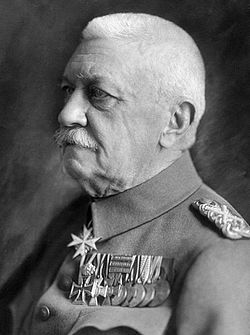Karl von Bülow
| Karl von Bülow | |
|---|---|
 |
|
| Born |
24 March 1846 Berlin, Kingdom of Prussia |
| Died |
31 August 1921 (aged 75) Berlin, Weimar Republic |
| Buried at | Invalidenfriedhof Berlin |
| Allegiance |
|
| Service/branch |
|
| Years of service | 1866–1916 |
| Rank | Field Marshal |
| Commands held | 2nd Army |
| Battles/wars |
Austro-Prussian War Franco-Prussian War World War I |
| Awards |
Pour le Mérite Knight Grand Cross of the Royal Victorian Order (United Kingdom) |
Karl Wilhelm Paul von Bülow (24 March 1846 – 31 August 1921) was a German field marshal commanding the German 2nd Army during World War I from 1914 to 1915.
Born in Berlin to a distinguished Prussian military family, Bülow enlisted in the Prussian Army and was assigned to the 2nd Guards regiment of infantry in 1864. He saw action during the Austro-Prussian War in 1866 and gained distinction at Königgrätz. Bülow served through the Franco-Prussian War of 1870 as a junior officer, winning the Iron Cross Second Class. A Captain of the German General Staff in 1877, Bülow was promoted to Colonel and assigned to the 9th Guards Regiment in 1894. In 1897, Bülow was a major-general and became director of the Central Department in the German War Ministry. In 1900 he was promoted to lieutenant-general and in 1901 was appointed general commanding the Guards Division. He was Commander of the German III Corps from 1903 until his appointment as Inspector of the German 3rd Army in 1912.
Assigned to the German 2nd Army at the beginning of World War I in August 1914, Bülow's army was part of the German force that invaded Belgium. He occupied Liege on 7 August and captured the fortress of Namur on 22–23 August. In France, Bülow defeated General Charles Lanrezac of the French Fifth Army at Charleroi on 23–24 August and again at St. Quentin on 29–30 August.
...
Wikipedia
